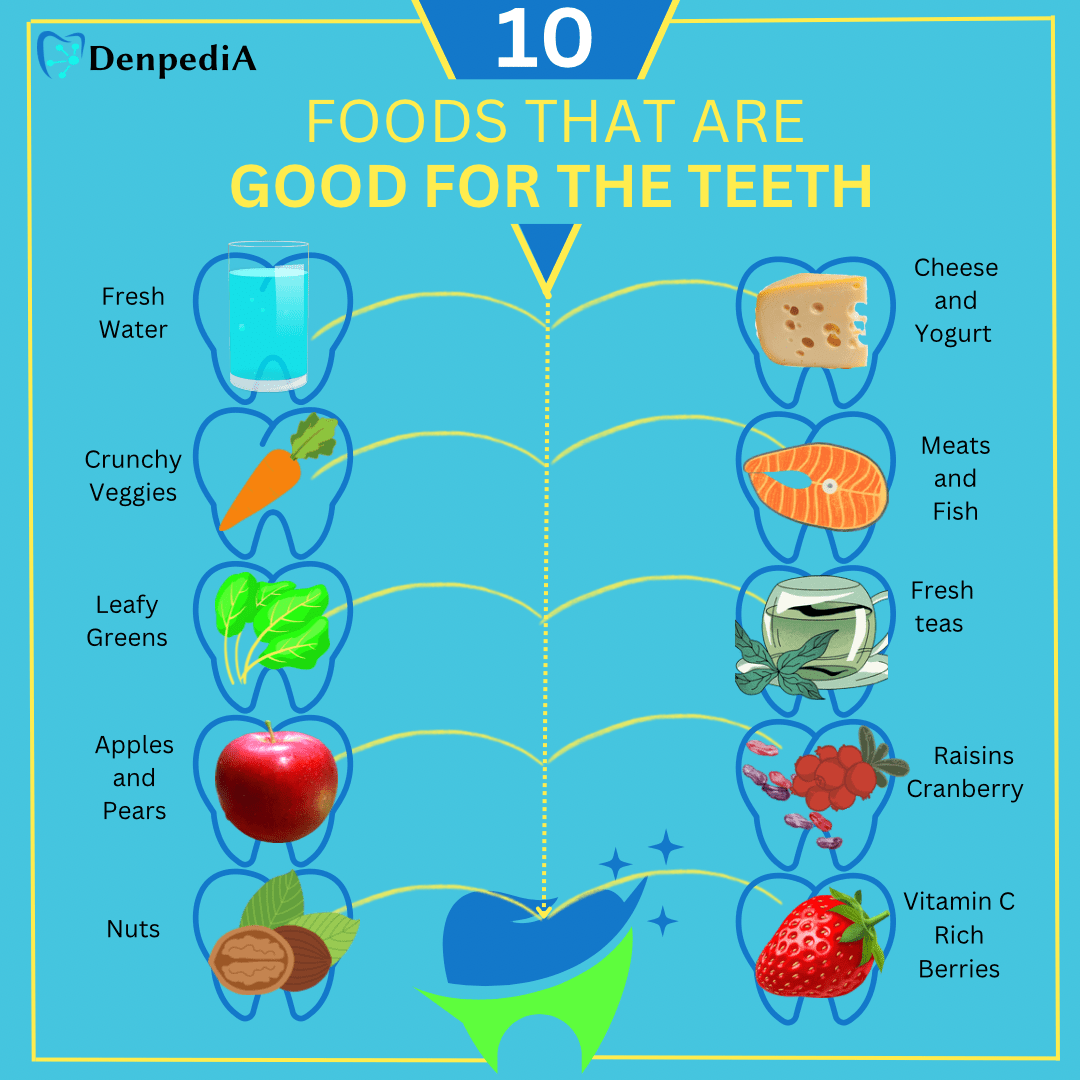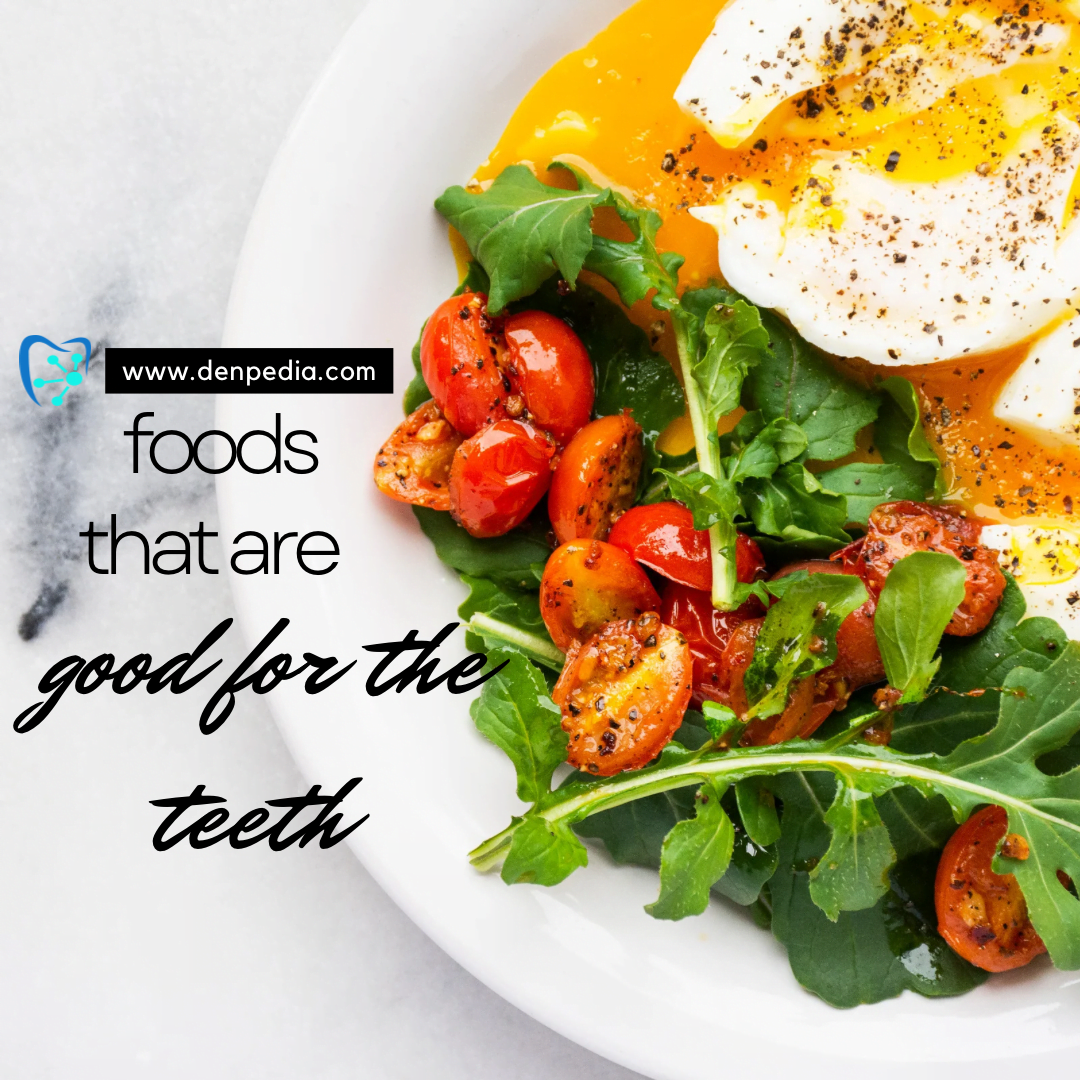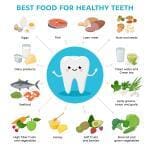Maintaining good oral health is essential for our overall well-being, and one of the key aspects of oral health is having strong and healthy teeth. While regular brushing, flossing, and dental check-ups are crucial, the foods you consume also play a significant role in preserving your dental health. In this comprehensive guide, we will explore a wide range of foods that are not only delicious but also beneficial for your teeth. From crunchy vegetables to dairy products rich in calcium, we’ll delve into the science behind how these foods promote dental health and offer practical tips on incorporating them into your diet.
The Importance of Dental Health
Before we delve into the specifics of tooth-friendly foods, let’s take a moment to understand the significance of dental health. Our teeth are not only vital for chewing and speaking but also play a role in our overall appearance and self-confidence. Healthy teeth can contribute to better digestion and are an integral part of our oral and general health.
Furthermore, poor dental health can lead to various oral problems, such as tooth decay, gum disease, and bad breath. These issues can impact our daily lives, causing pain, discomfort, and embarrassment. By incorporating the right foods into your diet, you can proactively support your dental health and reduce the risk of dental problems.
Foods That Promote Dental Health
- Crunchy Vegetables and Fruits
- Dairy Products
- Leafy Greens
- Nuts and Seeds
- Lean Proteins
- Tea (Green and Black)
- Water

Crunchy Vegetables and Fruits
Crunchy vegetables and fruits, such as carrots, celery, and apples, are excellent choices for maintaining healthy teeth. These foods require more chewing, which stimulates saliva production. Saliva contains enzymes and minerals that help neutralize acids and protect teeth from decay. Additionally, the abrasive nature of these foods can help remove plaque and debris from the teeth’s surfaces.
Tips for Incorporating Crunchy Vegetables and Fruits:
- Snack on raw carrot or celery sticks.
- Include apple slices in your lunch or as a mid-day snack.
Dairy Products
Dairy products are rich in calcium, a mineral essential for strong teeth and bones. Calcium helps strengthen tooth enamel, the protective outer layer of the teeth. Furthermore, dairy products like milk, yogurt, and cheese contain casein, a protein that can help repair and maintain tooth enamel.
Tips for Incorporating Dairy Products:
- Enjoy a glass of milk or a serving of yogurt as part of your daily routine.
- Include cheese in salads, sandwiches, or as a snack.
Leafy Greens
Leafy greens, such as kale and spinach, are not only excellent sources of vitamins and minerals but also contribute to dental health. They are rich in calcium, folic acid, and B vitamins, all of which support gum health and prevent gum disease.
Tips for Incorporating Leafy Greens:
- Add a handful of spinach or kale to your morning smoothie.
- Incorporate leafy greens into salads and sandwiches.
Nuts and Seeds
Nuts and seeds, like almonds, cashews, and sesame seeds, are nutritious snacks that can promote dental health. They are packed with calcium and phosphorus, which are vital for maintaining tooth enamel and bone health.
Tips for Incorporating Nuts and Seeds:
- Carry a small container of mixed nuts for a convenient and tooth-friendly snack.
- Sprinkle sesame seeds on salads or yogurt.
Lean Proteins
Lean proteins, including poultry, fish, and lean beef, are excellent sources of phosphorus, a mineral that works alongside calcium to strengthen tooth enamel. A diet rich in phosphorus can help repair and maintain healthy teeth.
Tips for Incorporating Lean Proteins:
- Grill or bake chicken or fish for a healthy and tooth-friendly dinner.
- Make a lean beef or turkey sandwich for lunch.
Tea (Green and Black)
Both green and black teas contain compounds called polyphenols that can help suppress the growth of bacteria responsible for plaque and tooth decay. These compounds also have anti-inflammatory properties that benefit gum health.
Tips for Incorporating Tea:
- Enjoy a cup of green or black tea as a soothing beverage.
- Opt for unsweetened or minimally sweetened tea to maximize its dental benefits.
Water
While not a food in the traditional sense, water is essential for maintaining dental health. Drinking water helps rinse away food particles, acids, and sugars that can contribute to tooth decay. Fluoridated water, in particular, can aid in strengthening tooth enamel.
Tips for Drinking Water:
- Carry a reusable water bottle with you throughout the day to stay hydrated.
- Rinse your mouth with water after consuming acidic or sugary foods.
Foods to Consume in Moderation
While the foods mentioned above are beneficial for dental health, there are certain items that should be consumed in moderation to prevent potential harm to your teeth:
- Sugary and Sticky Foods
- Acidic Foods and Beverages
- Alcoholic Beverages
Sugary and Sticky Foods
Sugary and sticky foods, such as candies, cakes, and cookies, can contribute to tooth decay when consumed frequently. The sugars in these items serve as a food source for harmful bacteria in the mouth, leading to the production of acids that erode tooth enamel.
Tips for Consuming Sugary and Sticky Foods:
- Limit your intake of sugary treats and consume them as occasional treats, not daily snacks.
- After enjoying sugary foods, rinse your mouth with water to help reduce the acidity.
Acidic Foods and Beverages
Acidic foods and beverages, including citrus fruits, tomatoes, and sodas, can erode tooth enamel over time. While these foods offer nutritional benefits, they should be consumed in moderation, and proper oral hygiene should be maintained.
Tips for Consuming Acidic Foods and Beverages:
- Consume acidic foods as part of a balanced diet, but avoid overindulging.
- Use a straw when drinking acidic beverages to minimize contact with your teeth.
Alcoholic Beverages
Alcoholic beverages, especially when consumed in excess, can lead to a dry mouth. A dry mouth lacks sufficient saliva, which is essential for neutralizing acids and protecting teeth from decay. Additionally, excessive alcohol consumption can increase the risk of gum disease.
Tips for Consuming Alcoholic Beverages:
- Drink alcohol in moderation and stay well-hydrated with water.
- Be mindful of your oral hygiene routine if you consume alcohol.
Foods for Special Dietary Considerations
Some individuals have specific dietary considerations or restrictions, such as vegetarianism, veganism, or food allergies. Fortunately, there are tooth-friendly options available for various dietary preferences:
- Vegetarian and Vegan Diets
- Gluten-Free Diets
- Food Allergies
Vegetarian and Vegan Diets
Vegetarians and vegans can maintain dental health by incorporating plant-based sources of calcium and other essential nutrients. Options include fortified plant milk, tofu, tempeh, and leafy greens. Many plant-based foods are also low in sugar and can be part of a tooth-friendly diet.
Gluten-Free Diets
People with gluten sensitivities or celiac disease can choose gluten-free grains like rice, quinoa, and corn. These grains are not only gluten-free but also less likely to adhere to teeth, reducing the risk of tooth decay.
Food Allergies
Individuals with food allergies must be cautious about ingredient labels and cross-contamination. Fortunately, there are allergen-free alternatives available, such as nut-free and dairy-free options for those with allergies to these common ingredients.
Conclusion
Maintaining healthy teeth is not just about brushing and flossing; it’s also about the foods you consume. A balanced diet that includes tooth-friendly foods like crunchy vegetables, dairy products, leafy greens, nuts, and lean proteins can help support your dental health. It’s important to remember that while these foods can help protect your teeth, moderation and good oral hygiene practices are essential.
In this comprehensive guide, we’ve highlighted the foods that promote dental health, discussed foods to consume in moderation, and offered solutions for individuals with special dietary considerations. To achieve and maintain strong and healthy teeth, it’s crucial to complement your diet with regular dental check-ups, proper oral hygiene practices, and a mindful approach to oral health.
By making informed food choices, maintaining good dental hygiene, and seeking professional dental care when needed, you can enjoy a confident and radiant smile while minimizing the risk of dental issues that can impact your overall well-being. Your journey to healthy teeth starts with the foods you eat and the care you provide, so make the most of your oral health and savor the benefits of a beautiful smile for years to come.






